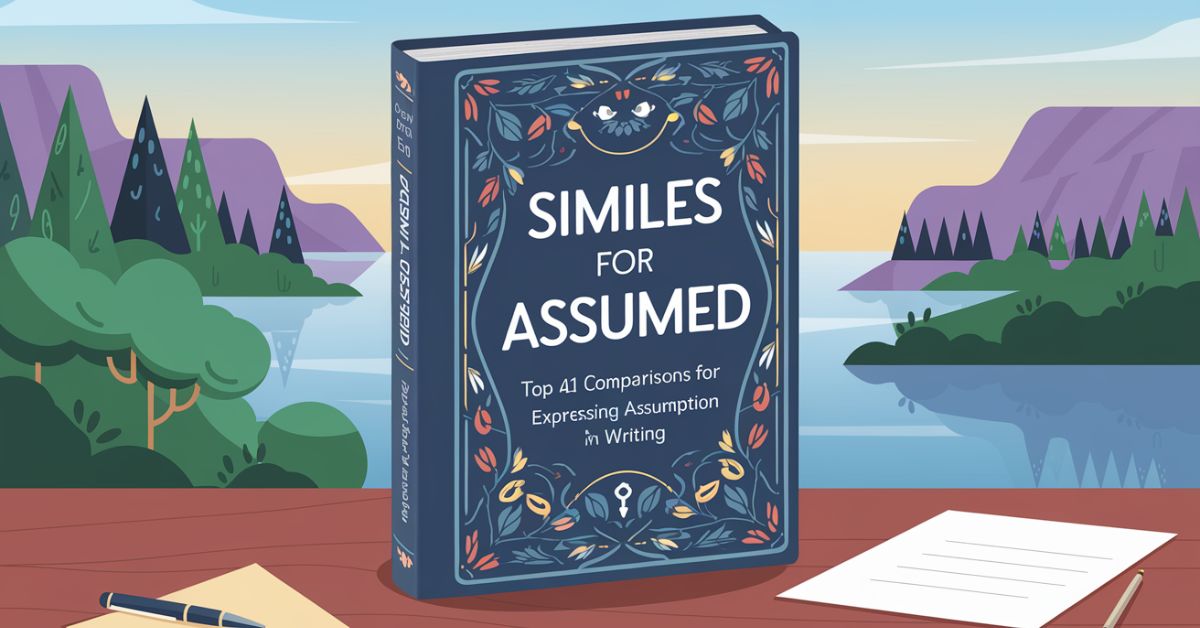Assumptions shape how we see the world, whether in storytelling, everyday conversation, or professional communication. Similes for assumed help paint vivid pictures, allowing readers and listeners to grasp meaning quickly.
These figurative expressions create depth in writing, making ideas more engaging and relatable.
Why Use Similes for “Assumed”?
Using assumption-based comparisons can make your writing more engaging. Instead of saying, “He thought he was right,” you could say, “He assumed like a sailor following the stars.” This adds imagery and makes the sentence more memorable.
Comparisons for assumptions also help readers connect with ideas in a familiar way, making abstract concepts easier to understand.
How Similes Enhance Writing
Figurative language, including assumption metaphors, strengthens communication. It helps create strong writing imagery for assumption, making it easier for audiences to grasp subtle meanings.
By using perception-based similes, you can evoke emotions, humor, or even philosophical depth. Whether you’re writing fiction, persuasive essays, or everyday dialogue, using expressing assumptions in writing techniques makes your message more compelling.
2. Top 41 Similes for Assumed
A. Common and Everyday Similes
These similes reflect daily experiences, making them instantly relatable. They convey how assumptions feel natural in certain situations.
- Assumed like a detective following a hunch.
- Assumed like the sun will rise tomorrow.
- Assumed like a chef tasting their own recipe.
- Assumed like a parent knowing their child’s habits.
- Assumed like a teacher predicting a student’s excuse.
- Assumed like an umbrella in a forecasted storm.
- Assumed like coffee will wake you up in the morning.
- Assumed like traffic during rush hour.
- Assumed like a librarian expecting silence in a library.
- Assumed like a customer expecting a receipt after a purchase.
B. Philosophical and Thought-Provoking Similes
For deeper, more contemplative comparisons, these figurative speech on assumption examples capture the complexity of belief and perception.
- Assumed like a philosopher pondering existence.
- Assumed like an ancient myth passed down for centuries.
- Assumed like a riddle waiting to be solved.
- Assumed like history repeating itself.
- Assumed like an unchallenged theory in science.
- Assumed like a dream interpreted in different ways.
- Assumed like a prophecy believed without proof.
- Assumed like a map leading to buried treasure.
- Assumed like faith guiding a pilgrim’s journey.
- Assumed like a forgotten memory suddenly feeling true.
C. Humor and Playful Similes
These similes are presumed to add fun and creativity to your writing. They lighten the mood while keeping your audience engaged.
- Assumed like a cat always landing on its feet.
- Assumed like socks disappearing in the laundry.
- Assumed like a GPS always knowing the way.
- Assumed like a WiFi signal being strong in every room.
- Assumed like finding fries at the bottom of the bag.
- Assumed like grandmothers knowing best.
- Assumed like an overconfident magician revealing their trick.
- Assumed like a dog barking at the mailman.
- Assumed like a reality show being scripted.
- Assumed like getting stuck at every red light.
D. Nature and Science-Inspired Similes
These writing metaphors for assumption connect assumptions to the patterns and forces of nature.
- Assumed like gravity pulling objects to the ground.
- Assumed like the tides following the moon.
- Assumed like birds flying south for the winter.
- Assumed like seasons changing predictably.
- Assumed like fire burning when fed oxygen.
- Assumed like a river always finding its course.
- Assumed like the wind pushing a sailboat forward.
- Assumed like the sun melting snow in spring.
- Assumed like honey attracting bees.
- Assumed like a chameleon blending into its surroundings.
- Assumed like thunder following lightning.
3. How to Use These Similes Effectively in Writing
Fiction and Creative Writing
Using creative literary expressions makes stories more vivid. For example, instead of saying, “She thought the plan would work,” you could write, “She assumed like a pirate trusting his compass.” This gives the reader an image while adding personality to the character.
Business and Professional Communication
In professional writing, language patterns for assumptions can simplify complex ideas. For instance, a business report might state, “It is assumed like gravity that customer demand will rise in summer,” making the prediction feel natural and certain.
Everyday Conversations
In casual speech, using common analogies for belief makes ideas more engaging. Instead of saying, “I thought he would be late,” you might say, “I assumed it was like a morning alarm going off late.” This makes the assumption feel more relatable and amusing.
4. Conclusion: Strengthen Your Writing with Assumption-Based Similes
Final Thoughts
Using comparative phrases for assumed enhances storytelling, adds depth to descriptions, and makes conversations more engaging. Whether you want to sound poetic, humorous, or thought-provoking, there is a perfect figurative language example to match your needs.
Experimenting with Your Own Similes
Try creating your own writing imagery for assumption by observing patterns in nature, behavior, or everyday life. The more unique and relatable your comparisons, the more compelling your writing becomes. So go ahead assume like a writer crafting their masterpiece!
Read More: Similes for Peace: 33 Beautiful Comparisons to Describe Tranquility
See Results: Similes for Mother’s Day: Celebrating Mom Through the Beauty of Similes
Learn About: Similes for Father’s Day: Expressing a Father’s Love and Strength

